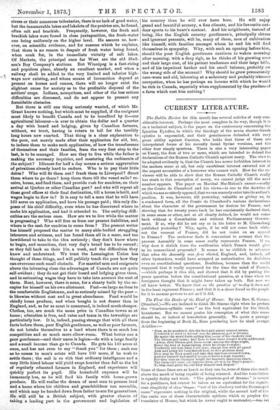CURRENT LITERATURE.
The Dublin Review for this month has several articles of very con- siderable interest. Perhaps the most complete in its way, though it is
on a technical subject, is the paper on the controversy concerning the Ignatian Epistles, in which the theology of the seven shorter Greek epistles is expounded, and their genuineness defended with very great ability against Cureton, who holds that three of them are interpolated forms of his recently found Syriac versions, and the other four simply spurious. There is also a very interesting paper
on Usury, the first of two or more, which are intended to defend the declarations of the Roman Catholic Church against usury. The view to be adopted evidently is, that the Church has never forbidden interest in the modern sense at all, but only exorbitant interest extorted out of the urgent necessities of a borrower who cannot wait. How far the re- viewer will be able to show that the Roman Catholic Church really has stuck to this conception of usury, we cannot judge till the next number appears. The paper on Marshal MacMahon's career—really on the Comte de Chambord and his views—is one to the doctrine of which we are so utterly opposed, that we can scarcely enter into its author's position. It was, however, till yesterday, valuable as giving us, in a condensed form, all the Comte de Chambord's various declarations about the character of the government he desires for France. and showing that for twenty years back he has consistently declared that, in some sense or other, not at all clearly defined, he would not come back without a Constitution and without Parliamentary Govern- ment. If so, why did he not say so in his letter to II. Chesnelong published yesteiday ? Why, again, if ho will not come back with- out the consent of France, did he not insist on an appeal to France ? The reviewer finds it convenient to assume that the present Assembly in some sense really represents France. If so, why does it shrink from the verification which France would give to its monarchical proposals? It seems to us childish to advance _that when the Assembly was first elected, England, and, indeed, all other bystanders, would have accepted as authoritative its decisions even on constitutional questions. Doubtless, because then the world supposed that it really expressed for the time the mind of France, —which perhaps it then did, and showed that it did by putting the peace question before the constitutional question, at a time when we foreigners thought that it might have taken up both. But now we all know better. We know that on the question of to-day it does not in the least represent France ; and that it is a sheer fraud on the people for it to assume powers to act as if it did.


































 Previous page
Previous page